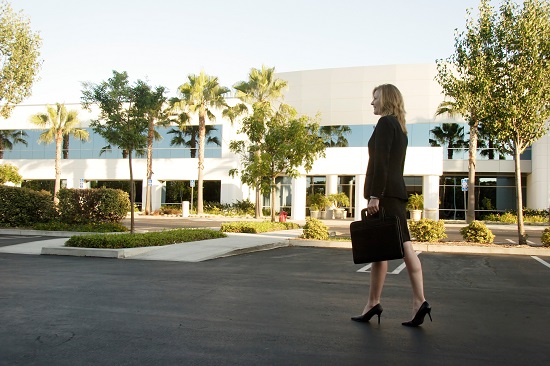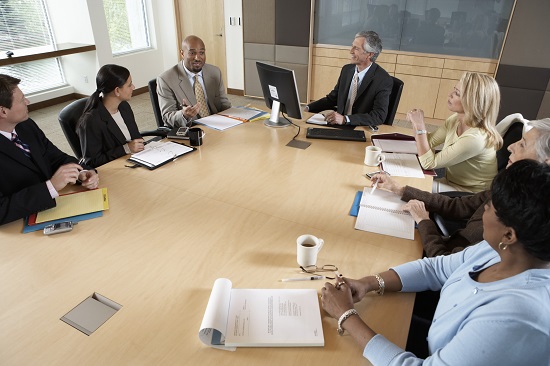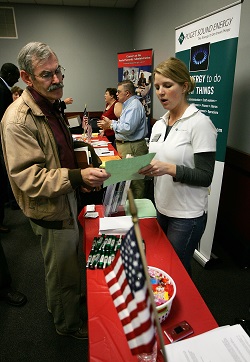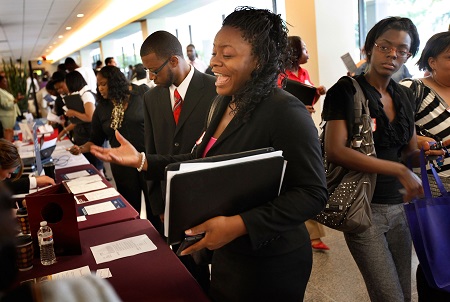An official website of the United States government
 United States Department of Labor
United States Department of Labor
| April 2016
For many people, job interviews are the most stressful part of any employment search. But they don’t have to be.
Employment interviews are an opportunity to show you’re an enthusiastic worker who would do a job well. You can make the most of that opportunity by being prepared, presenting a professional demeanor, and describing your qualifications well.
There are many types of employment interviews, and each may have a different purpose. Screening interviews, for example, are designed to whittle the applicant pool. Group or panel interviews yield multiple perspectives from a single meeting. And telephone and videoconferencing interviews help employers find the best prospects before investing time and effort in a face-to-face interview.
Regardless of the purpose of your interview, you’re more likely to do well if you first learn some basic interviewing skills. Read on for advice about what to do before, during, and after a job interview.

Career counselors say a good job interview starts well before the jobseeker and interviewer meet. Preparation can be as important as the interview itself. Researching, practicing, and dressing appropriately are the first steps to making the most of a job interview.
Research. Learning about the company and the position for which you are being interviewed is essential—and it will help you to show employers that you are really interested.
Before arriving for an interview, you should know what the company does and any recent changes it has undergone. Learn about the company’s mission and goals. With these in mind, you can show during the interview how your qualifications match the company’s needs.
The company itself is often the easiest place to start your research. Many businesses have information on their websites that’s tailored to jobseekers. But don’t stop there: In-depth research is important. Read news publications, trade journals, and other sources of information to learn more about the company.

Employment and social media sites, especially those related to business networking, may have more specific information about the company’s culture. For example, current and former employees may post reviews of the employer or offer details about questions they were asked during a job interview.
Practice. Another important step in preparing for a job interview is to practice describing your professional characteristics. Think of examples from past jobs, schoolwork, and activities to illustrate important skills. Recalling accomplishments beforehand, when you are not being evaluated, helps you to give solid answers during the interview.
Every interview is different, and it’s always possible there will be questions that surprise you. Nevertheless, interviewers suggest rehearsing with a career counselor or a friend to build confidence and poise. As a starting point, try answering these questions aloud:
Each question allows you to illustrate your favorable characteristics. When responding, focus on subjects related to the job. For example, if asked to describe yourself, talk about your professional characteristics and background, not your personal life.
Some questions, such as those about hobbies or interests, may seem irrelevant. Interviewers ask these types of questions to learn about your personality and test your interpersonal skills. These questions also let you highlight some of your other strengths. Participating in a sport might demonstrate teamwork, for example. And ability in a craft, such as jewelry making, might show your attention to detail.
Whatever the question, emphasize the positive. If there is a weakness evident on your résumé or transcript, such as being fired from a job or receiving poor grades, rehearse an explanation before the interview in case you are asked about them. Focus on what you learned from the experience, and be careful never to criticize a previous employer or coworker.
Look professional. Dress for an interview as you would for an important day on the job, such as a meeting with a supervisor or a presentation to a client. Don’t let your appearance distract the interviewer from your qualifications.

Keep your hair neat, and cover any tattoos or piercings, if possible. Avoid cologne and perfume, large pieces of jewelry, and heavy or unnatural makeup. Clothes should be clean, ironed, and fit well. And shoes should be polished and closed-toe.
Many employers expect jobseekers to wear a suit—preferably one in a conservative color such as navy blue, gray, or black—but not all do. A company with an informal dress code might be fine with your wearing a button-down shirt and dress slacks. If you’re not sure about what to wear, dressing up is more prudent than dressing down.
On the day of the interview, give yourself plenty of time to get ready for and travel to the interview. Plan to arrive 10 to 15 minutes early. (Some career counselors suggest making a test run to the interview site in advance to familiarize yourself with the travel route.)
Consider carrying a folder or briefcase to the interview so you have access to things you’ll want while you’re there. These include a pen and paper to record important information, such as the proper spelling of the interviewer’s name and the time and date of followup interviews; copies of your résumé or application and references; and examples of your work, such as writing samples.
Similarly, have these items within easy reach for interviews conducted over the phone or through videoconference. For phone interviews, consider disabling call waiting on the day of the interview; you don’t want to put the interviewer on hold, and persistent call-waiting beeps may distract you. For videoconference interviews, make sure that the Web camera is angled correctly and that the surrounding area is neat.
Nervousness. It’s natural to feel nervous when interviewing. But remember: You have skills the employer needs. The interview is your chance to show how those skills would be a good fit for the job.

To reduce nervousness, interviewers recommend getting a good night’s sleep and maintaining your usual morning routine. If you never eat breakfast, for example, don’t eat a hearty morning meal on interview day. They also recommend putting yourself in a positive mindset before the interview by calling to mind some of your happiest memories or proudest moments.
And they remind jobseekers that each opening you interview for is not the only one that exists. There are openings with other companies that might be a better fit. Every interview is an opportunity to practice getting more comfortable talking about yourself.
First impressions. An in-person interview begins the moment you arrive. Everyone you meet, from the receptionist to the hiring manager, will form an impression of you. To ensure the impression is positive, remember that your words and mannerisms affect how others perceive you.
Making a positive impression is just as important when you interview remotely. Remember to speak clearly and listen attentively, just as you would if you were meeting with the interviewer in person. Even if no one can see you, your voice betrays attitudes and confidence; sometimes, sitting up straight helps to project enthusiasm.
Standard politeness is important in an interview because the interviewer knows little about you. For example, don’t presume that you should use your interviewer’s first name just because the company atmosphere is relaxed.
Responding to questions. After introductions, the interviewer may explain the job in more detail, discuss the company, or initiate friendly conversation. The interviewer will then ask questions to gauge how well you would fill the position.
When responding to the interviewer, avoid vague answers, such as, “I want to work with people” (or animals, or cars, or whatever the job entails). Instead, describe the specific ways you want to work with them, perhaps by giving examples of how you have successfully done so in the past. Focus on your strengths, but be honest.

Let the interviewer direct the session. He or she may use your resume as a guide and ask for additional details. Listen attentively, and answer each question completely. Pay attention to the interviewer’s mannerisms for clues about whether to elaborate or to keep your responses short.
Some jobseekers are so focused on specific answers that they forget to relax and connect with the interviewer. An interview should be conversational. However, that doesn’t mean you’re expected to speak without pause. Stop to consider an answer before responding to difficult or unexpected questions. And if a question is confusing, ask for clarification.
In a group or panel interview, try to engage the whole group. When interviewing with other candidates for a job, take initiative in responding to questions—but be careful not to dominate the discussion.
Turning the tables. At some point, usually toward the end of the interview, you will have the opportunity to ask your own questions. Use this time to learn more about the position—and, often, the person who would be your boss. After all, you’re also deciding whether you want the job.
Questions you might want to ask include:
An interview is not the time to inquire about salary or benefits; the best time to discuss those topics is after you have been offered the job. You don’t want to seem more interested in financial rewards than in contributing to the company. If asked about salary requirements, try to convey flexibility.
Before leaving the interview, make sure you understand the next step in the hiring process. Find out whether there will be another round of interviews, whether you should provide additional information, and when a hiring decision will be made.
And remember to thank the interviewer at the end of the interview.

Even after the interview is over, an important task remains: Secure a good impression by sending a thank you letter to the interviewer, preferably within 2 days.
Thank you letters should be brief—a few paragraphs if emailed, less than one page if typed or handwritten. Thank the interviewer for the opportunity, briefly reiterate your skills, and confirm your enthusiasm for the job.
Address the letter to the person who interviewed you, and make sure to spell his or her name correctly. If a group interviewed you, write either to each person you spoke with or to the person who led and coordinated the interview, mentioning the other people you met. Be sure to proofread the letter, and ask someone else to proofread it, too.
If you don’t hear back within the time frame the interviewer specified, call or email to check on your status. Making that extra effort could mean the difference in getting the job—or not.
Visit your local library or career center for books and other resources on employment interviewing. You can also find lots of information online, including these sites:
Note: This article updates information originally published in 2000.
Job fairs offer an opportunity for face-to-face meetings between jobseekers and employers. Visiting these fairs is often an easy way to find good job leads. Many employers attending are there to hire workers, after all. And you can talk to recruiters, browse brochures, and distribute your résumé.
Making a good impression at a job fair may give your résumé or application added weight. The following tips can help you make the most of any fair.

Find the fair. Career centers, associations, state and local governments, and private companies organize job fairs. Find fairs in your area by searching online, asking a career counselor, reviewing business postings at your school or local library, or checking the newspaper employment section.
Ready your résumé. Before attending a fair, you should prepare a résumé. Bring several copies to the fair. Leave at least one with every company that seems promising. A résumé lists your name, contact information, education, and experience, both paid and unpaid. It emphasizes accomplishments and skills. Most résumés for entry-level jobs are one page.
Look the part. A job fair is like a series of mini-interviews, with recruiters forming impressions of the people they meet. You might not need to wear a suit, but too-casual clothes could be a strike against you. Clothes that are too short, too tight, too worn, or too playful are particularly risky. Similarly, be aware of your body language. Standing up straight and looking recruiters in the eye when talking to them, for example, projects confidence and may help to create a more positive rapport.
Go alone. You’ll get the most out of a job fair—and make a better impression—if you attend solo. If you plan to go with a friend, don’t appear to be inseparable when visiting booths. A professional image is easier to maintain if you speak to employers alone.
Plot a strategy. A few days before the fair, ask for a list of participating companies. Then, rank companies you’d like to visit so you can make the best use of your time. When you arrive on the day of the fair, take a quick walk through the venue. Locate the company representatives you want to meet, and plan your route for the event. Time is limited, and booths are crowded. Save visits with the best prospects until after you’ve warmed up with a few other prospective employers.
Complete applications flawlessly. If a company distributes application forms, take two; one will be a rough draft. And if you complete an application online or bring one home to send later, consider noting that you met the recruiter at the fair.

Master the mini-interview. Every time you speak with an employer, no matter how briefly or how boisterous the atmosphere, consider it an interview. Recruiters will expect you to introduce yourself, shake hands confidently, answer questions about your coursework or experience, and have an idea of the type of job you want. Finding out about the company is equally important. You might ask what the hiring process is like or what jobs are available for people with your education. Before you leave the booth, be sure to ask for the recruiter’s business card—and thank him or her for taking time to talk with you.
Take notes. After visiting several booths, it’s easy for conversations to run together. After each visit, take a few notes to read at home.
Stay organized. Fairgoers are deluged with information—company literature, recruiters’ business cards, and their own notes. Bring a folder or backpack to keep materials organized. Counselors suggest going through this information while your memory is still fresh.
Apply in absentia. If you cannot attend the job fair, contact the sponsoring organization. You may be able to submit your résumés to participating employers before or after the fair.
Olivia Crosby (updated by Elka Torpey), "Employment interviewing: Seizing the opportunity and the job," Career Outlook, U.S. Bureau of Labor Statistics, April 2016.